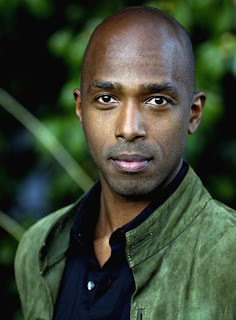 Ugandan gay politics have been receiving a great deal of attention lately or more so than most nations, African or otherwise. Just a few weeks ago, one of the few gay-themed films at the LA Film Festival was the documentary Call Me Kuchu. The brief history of the nation's gay struggle also served as a profile of David Kato, who was slain during production and detailed in the immediate aftermath. Artist Ntare Guma Mbaho Mwine closed his four-performance weekend on Sunday at the REDCAT. Emily Hoffman directed his distinctive characters, most of them out gays (as much as they can be), all with their own soliloquies. Mwine has used his film/TV success (he's currently starring in HBO's Treme) as well as Kickstarter to produce his one-man show. Additionally, the actor is a prominent filmmaker and turned his production into a multi-media show including photos and footage projected on a screen as well as sheer curtains waving gently at various points on the REDCAT stage.
Ugandan gay politics have been receiving a great deal of attention lately or more so than most nations, African or otherwise. Just a few weeks ago, one of the few gay-themed films at the LA Film Festival was the documentary Call Me Kuchu. The brief history of the nation's gay struggle also served as a profile of David Kato, who was slain during production and detailed in the immediate aftermath. Artist Ntare Guma Mbaho Mwine closed his four-performance weekend on Sunday at the REDCAT. Emily Hoffman directed his distinctive characters, most of them out gays (as much as they can be), all with their own soliloquies. Mwine has used his film/TV success (he's currently starring in HBO's Treme) as well as Kickstarter to produce his one-man show. Additionally, the actor is a prominent filmmaker and turned his production into a multi-media show including photos and footage projected on a screen as well as sheer curtains waving gently at various points on the REDCAT stage. One of the main reasons Uganda has been in the news these past few years is because of MP David Bahati introducing his Anti-Homosexuality Bill in 2009. Better known as the "Kill the Gays" bill, the euphemism perfectly spells out its intent, among other objectives, including three-year sentences to anyone who DOES NOT report someone they know to be gay within 24 hours. The outlandishness of the proposed law is only topped by its imagined execution, both literally and figuratively. Several world leaders, including President Barack Obama and Secretary of State Hillary Clinton have vocally opposed the bill. When British PM Gordon Brown threatened to cut aid, the matter was tabled only to be reintroduced again. Some of the more defiant proponents of the bill are prepared to choose poverty over "immorality," and a subsequent vote would likely result in its passing. As it stands now, victories are defined by a court ruling that a couple's rights were violated when authorities busted into their home and physically harassed them, as well as awarding nominal damages to unassuming people who were outed by a nefarious public tabloid.
 |
| Ntare Guma Mbaho Mwine |
One of his next characters is a refined minister whose inner sexual turmoil informs his spirituality. He's a man without a foundation who has called into question even his Ugandan identity, as he is gay. He shares how the Westernized import of Christianity ironically annihilated the country's originally progressive attitude towards gay relationships. "If homosexuality is not Ugandan, then is Christianity?" He theorizes the Original Sin was not Adam eating the apple, but God breaking up the first community, resulting in mankind struggling with this fractured sense of being ever since. He subsequently endeavors a relationship with a limousine European liberal and laments that his fear of death stops him from doing more than David Kato.
I visit Gay Patriot a great deal (a conservative political blog) and often share my thoughts on their comment threads. I always get a kick out of those who over-criticize PRIDE and all of its debauchery and perceived irrelevancy. Yet, the endless summer celebrations across the Westernized world have inspired other countries and inconspicuously affected change. The entertainment industry has also played a role. The L Word's random broadcasting in the early 2000s prompted a gathering for gays at a local Ugandan bar called Sapho Island, echoing the origins of Stonewall. Such seemingly innocent events are what plant the seeds of progress. To discredit or ignore this seems disingenuous. The Nile ain't just a river that flows through Uganda. Mwine demonstrates rather methodically, that standing up, no matter how seemingly insignificant, matters.
No comments:
Post a Comment